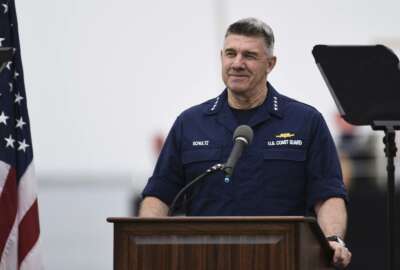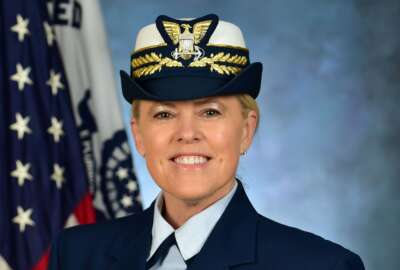Hubbard Radio Washington DC, LLC. All rights reserved. This website is not intended for users located within the European Economic Area.
The Coast Guard prepares for a new financial management system
It's not easy for a federal agency to cut over to a new financial management system. But that's what the Coast Guard is about to do.
Best listening experience is on Chrome, Firefox or Safari. Subscribe to Federal Drive’s daily audio interviews on Apple Podcasts or PodcastOne.
It’s not easy for a federal agency to cut over to a new financial management system. But that’s what the Coast Guard is about to do. Coasties are about halfway through the cutover period, with Nov. 17 as the date for completion. For how it’s all going, Federal Drive with Tom Temin turned to the assistant commandant for resources and the chief financial officer, Rear Admiral Mark Fedor.
Interview transcript:
Tom Temin: Commodore Fedor, good to have you on.
Rear Admiral Mark Fedor: Hey, Tom, great to be here. And thanks for having me.
Tom Temin: So first of all, the target system, what is it called, and how ready is it at this point?
Rear Admiral Mark Fedor: So the target system is called the Financial Systems Modernization Solution, FSMS for short. And it’s an Oracle based kind of commercial off the shelf system that the Department of Homeland Security has implemented, wants to implement across all the components in the department. So far, countering weapons of mass destruction and TSA are the two components that are on it, and we are the third one. And we are the most complex just because of our broad range of missions associated with it.
Tom Temin: And what is going on now, I guess, the cutover period, the gray area started October 1 runs to November 17. And what are practitioners of finance in the Coast Guard supposed to be doing?
Rear Admiral Mark Fedor: So what we did was we timed it with the beginning of the fiscal year. So we shut off our legacy system known as the Core accounting system. So that was shut off day before the start of the fiscal year on October 1. So that went off. And what we implemented now is a temporary system called the Cutover Financial System. And really all that is is a temporary repository to document all the transactions that occurred during this turnover period. And the reason that’s important is, as the CFO of the Coast Guard, the nation’s Coast Guard needs to keep operating. That’s what I promised the Commandant of the Coast Guard and to our men and women operating out there, they need to be able to procure, contract, mission essential operational equipment, so they keep operating, that’s what the nation expects of us. So even though we’re going through this big transition, and moving millions of lines of code to this new FSMS, that Financial Systems Modernization Solution, the Coast Guard needs to keep operating. So we built that temporary repository to capture that. The other thing we implemented to help folks out on the field is the message that you refer to is we call it a system fast. It’s just a financial, FSMS assist/support team. And it’s just means to help our folks out in the field navigate this Cutover Financial System, and to get them ready to transition to the new FSMS. We are a very disaggregated service, unlike TSA who sivery centralized, we are very disaggregated. And so we needed to make sure that our folks out in the field, understood how to use this Cutover system and then get ready to go to the new system as well. So far, it seems to be working well. As of Friday, we received about 160 inquiries on this new system. Of those, 100 were resolved via an online, kind of essentially it’s a crowdsourcing system where people go on, they pose their question, others help out, we have subject matter experts there that can help out, kind of in the CFO world, that’s called tier zero support. But also, if somebody has a problem that can’t be handled at that tier zero level, they can submit a help ticket. And that goes to more of our technical subject matter experts who can address that, that’s kind of the tier one, tier two when you start getting to technical issues. So that’s there too. And so of those 160 inquiries, 100 were resolved via that kind of informal method. And then 60, were farmed out to that tier one level support. And most of those have been resolved within two days. So we think we’re tracking pretty well and the fields pretty content with where we are.
Tom Temin: And who is on the FAS team? Is it Coast Guard people, Oracle people, or is it people from the integrator?
Rear Admiral Mark Fedor: It’s people from the integrator, and it’s also Coast Guard folks, we knew we needed to have Coasties involved here. Our men and women out in the field, we all kind of speak the same language. And if they were just talking to a pure contractor who may not be that familiar with us, that interaction might not go so well. So we wanted to make sure we had Coasties that were involved in that. They could speak the same language, maybe translate what the contractor, who might be very familiar with the system, but maybe not be able to translate it to Coast Guard speak. So we just needed those Coast Guard folks in there as well. So it’s a combination.
Tom Temin: We’re speaking with Rear Admiral Mark Fedor, he’s the assistant commandant for resources and chief financial officer of the Coast Guard. So you’re confident then that these transactions which are being warehoused so to speak, and then fed into the system when it starts up November 17, will process correctly?
Rear Admiral Mark Fedor: We are confident, but we’re also realistic. Our hope that this temporary system was built so that once the transactions are entered, it should be able to be automatically migrated into FSMS. However, just being realistic, we recognize that not all of them will probably be so, due to a variety of reasons. Maybe there was some error in the entry, and maybe the data just isn’t compatible for some reason. So there probably will be some manual entry that is required as we go live with that new system, FSMS. And we’re prepared to do that we’ve kind of built in some front loaded support so if there is some manual data entry that has to be done, we will be ready to do that.
Tom Temin: And what about the legacy data from Core accounting system, that is to say, the transactions that are already done that go back however many years, those are now in the FSMS?
Rear Admiral Mark Fedor: So that’s what’s happening over this cutover period. That’s why we had to create a temporary system. So when we shut down that legacy financial system, the migration of all that legacy data, going back years, decades, was being migrated over to FSMS. And that’s being done in series of what we call data packets. So kind of programmatic packets to deal with one area of the Coast Guard, we have an office that is dedicated to just doing that, working with a system integrator to make sure that data is compatible as it transitions. And that is something that is very complicated. Anyone who’s done this type of work, you’re talking about millions of lines of code with just one keystroke and can cause an error. So we have people really working around the clock, there are calls that occur over the weekend through different program offices, including folks in my office who can kind of help navigate this process. And so this work is going on, and it will continue probably till about the beginning of November, when the integrator really needs to turn on the product environment as it’s called. And that’s essentially the new system. So all the data really needs to get in there by that first of November, so that we can go live on the 17th of November.
Tom Temin: So in effect you are changing the propeller on a cutter while it’s underway, and just having people row until you get the new one on.
Rear Admiral Mark Fedor: That’s essentially what we’re doing. That’s a great analogy and I equate it too, I’m a cutter man by trade, so I spent a lot of time on ships. And whenever you first get underway, after a long period of import, and you’re doing a lot of work on the ship, you take in that last line from the period, usually line two, there’s a feeling of nervousness, anxiety, but also excitement on what lies ahead. So when we turn off that legacy system, we are essentially underway in the financial world as we make this transition. So there’s work that’s going to go on, like a ship that’s just getting underway after a long period, things go wrong, you have to deal with certain issues, you got to navigate your way out of that port. That’s what we’re doing right now. But I am hopeful come 17 November, that will kind of be on open ocean, essentially. And we’ll be able to kind of open her up a little bit and do some good things for the organization, because this new system will really enable us to be more efficient, will enable us to look at data and transactions across the entire enterprise. So we can really kind of look at trends, how we’re spending our money across the enterprise, and enable us to be more efficient, and really better stewards of the taxpayers dollars at the end of it. So I am optimistic as we move forward.
Tom Temin: Now these 160 queries and questions about the system is data from the learnings, they’re being fed back into tweaks to the final system?
Rear Admiral Mark Fedor: So most of these questions are about this temporary system that Cutover financial systems. So that system will essentially go away. However, what we’ve created, this kind of crowdsourcing of answers, this same system will get fed into the hypercare once we go live on FSMS. So that’s just basically, we know people have questions, they’re training on this new system, but there will be questions once we go live on it. So this system that we created, it will work with the integrators plan to maintain, kind of provide the maintenance and help desk requirements once we go live. Ours will just be done at a more Coast Guard level so folks can log in their request, they can chat with other Coast Guard members, they can figure out how they’re doing things. And we think that world of work, that way of doing business will really help people on that new system as well. So it’s gonna translate, it’s gonna migrate to that new financial system as well.
Tom Temin: And you did do a survey of change over readiness among the procurement and contracting and financial and accounting staffs. Are they ready? What did the survey show?
Rear Admiral Mark Fedor: We’ve done several surveys actually. And it shows that people are aware of it. Like I said before, I think it shows that people are a bit nervous, there’s some anxiety there. But I feel very good as I talk to folks in the field, that there is a awareness that this system is coming. There’s also awareness of the long term benefits once we go live. And just to give you an example, I was visiting some of our cutters in Pensacola, Florida. And so there’s an ensign that I talked to on one of the ships, so that’s a brand new officer out of the Coast Guard Academy. She is charged with being the supply officer on that ship. And I asked her about FSMS and this Cutover financial system and I was pleasantly surprised that she was very well versed in the system and doing what she was doing with her team of financial managers on board that ship to use this new system and to get the training on the new system moving forward. So that tells me that we’ve kind of broken squelch. We’ve reached literally the deck plate level of cutters around the Coast Guard. And they know that this system is coming. So again, I think apprehension of this transition, some nervousness, but also excitement that we will be better off for it once we’re able to go live.
Tom Temin: And for the supply officer, is there a special code for cigars?
Rear Admiral Mark Fedor: We try to we try to limit the transactions to only mission essential requirements. You have to use your own money for cigars.
Tom Temin: All right, Rear Admiral Mark Fedor is the assistant commandant for resources and the chief financial officer of the Coast Guard. Thanks so much.
Rear Admiral Mark Fedor: Thank you Tom. I really appreciate you following up with us.
Copyright © 2024 Federal News Network. All rights reserved. This website is not intended for users located within the European Economic Area.
Tom Temin
Tom Temin is host of the Federal Drive and has been providing insight on federal technology and management issues for more than 30 years.
Follow @tteminWFED
Related Stories
Related Topics
On DoD

WEDNESDAYS, 11 A.M. & 2 P.M.
Each week, Defense Reporter Jared Serbu speaks with the managers of the federal government's largest department. Subscribe on PodcastOne or Apple Podcasts.





